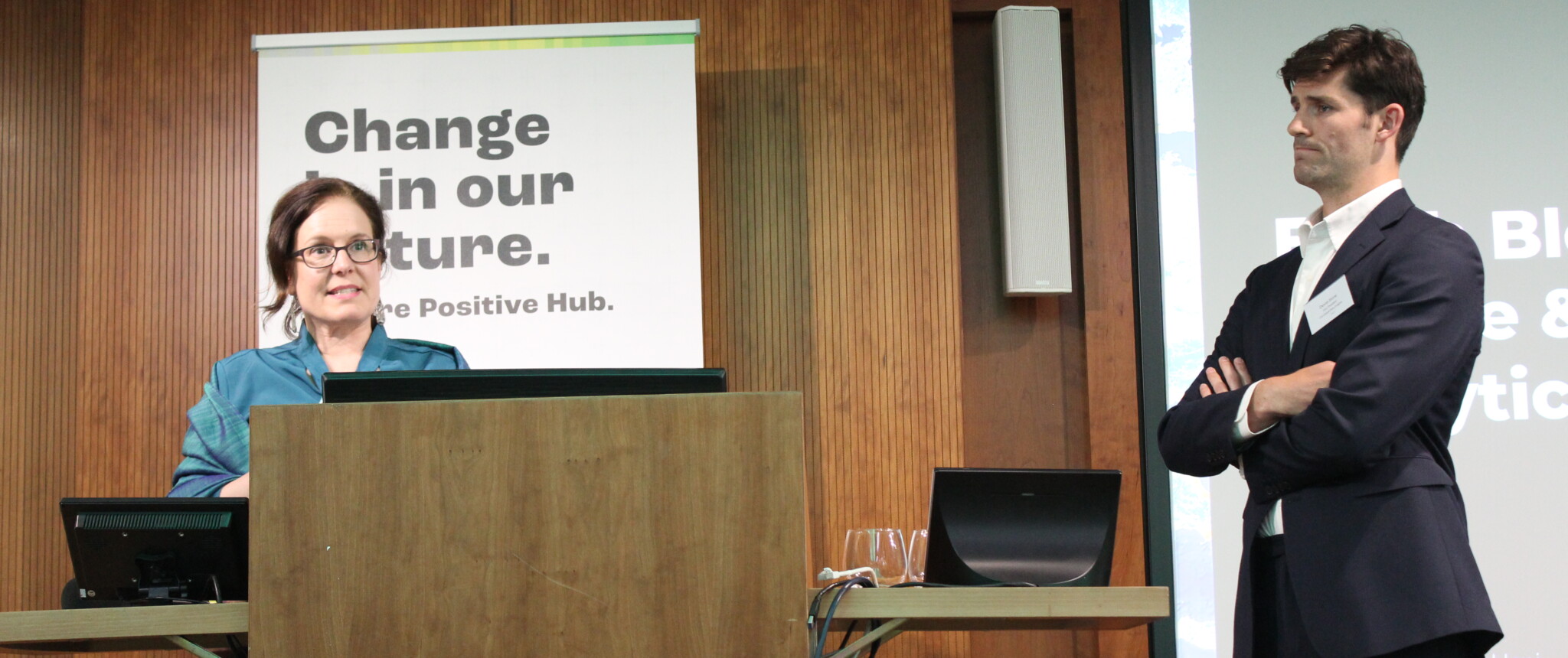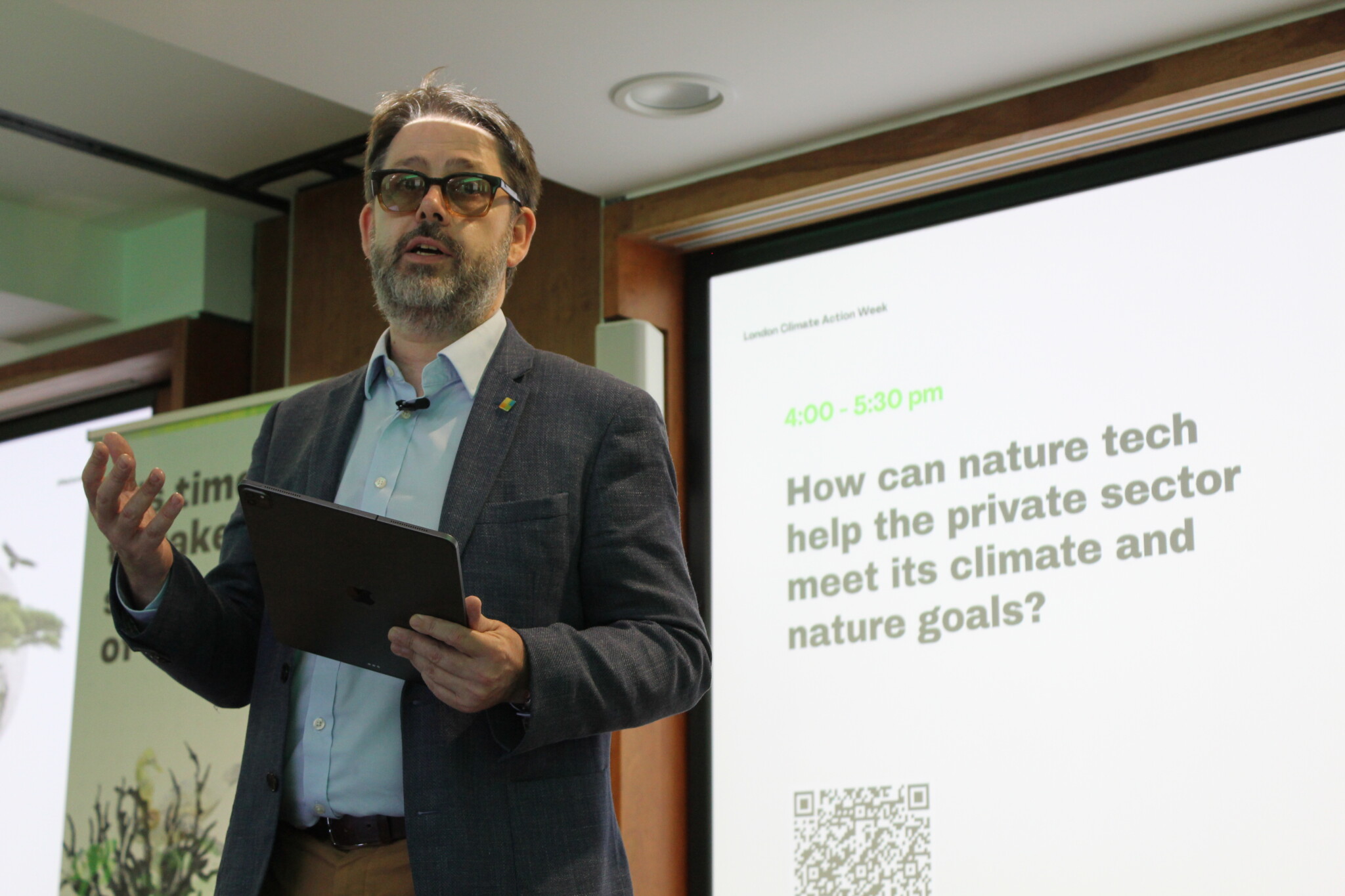
Nature4Climate invited four pairs of speakers – one nature tech entrepreneur and one private sector client – to share examples of their work. Photo: Mariana Ceccon/Nature4Climate
Read more
Related articles for further reading
WRAPPING-UP
+ Nature tech entrepreneurs and the private sector are already working together very effectively and complementing each other’s expertise.
+ These partnerships are working to monitor nature remotely; track and reduce risk; assess the performance of nature-based projects and identify project potential.
+ Nature tech is creating high-quality data. Now we need more collaborations with the private sector to turn these insights into action.
Ever-popular, Nature4Climate’s nature tech event at London Climate Action Week drew a large audience. This was no surprise. Venture capital funding to nature tech startups increased 18 percent in 2023 – a clear indication of interest.
With a clear enthusiasm for nature tech, Nature4Climate’s Director, Lucy Almond, opened this final discussion at the Nature Positive Hub in Cavendish Square. Frequently discussed across London Climate Action Week, she sensed a mainstreaming of the emerging nature tech market.
Mark Gough of Capitals Coalition moderated the session, welcoming nature tech speakers from Earth Blox, Cultivo, Pachama and SEED and private sector partners from BCG, Salesforce, Citi Global Data Insights and Octopus Energy.
Real, practical collaboration
Nature4Climate’s event invited four pairs of speakers – one nature tech entrepreneur and one private sector client – to share examples of their work.
Although each presentation showed differing applications of nature tech, one theme clearly emerged: Actual, practical, real-life collaboration.
These partnerships are not merely paying lip service to the word collaboration – they are pooling their skills to deliver for nature and climate. Here are some examples of how these partnerships are deploying nature tech right now.
To provide remote ‘boots’
When a private company has a huge number of sites or dependencies, monitoring nature with ‘boots on the ground’ is not always possible. To be accurate and comprehensive, they need a remote solution.
Satellite sensing can provide just that. One pair of speakers discussed how satellite imagery can provide analytics at scale, specifically tailored to a company’s needs.
With their platform, it is possible to assess nature-related risk, dependence and opportunity in line with regulatory requirements, such as EUDR, TNFD and IUCN. This allows their clients to see where it is most important to take action for nature – and then to prioritise accordingly.
When the company started working with a private-sector data science team, they approached nature from a risk control and risk assessment perspective. By overlaying historical and current satellite data, they visualised the company’s impact on a vast scale.
They described how this process turned a ‘nature problem into a data problem’ to make the challenges relevant to a private sector boardroom.

Mark Gough of Capitals Coalition moderated the session, welcoming nature tech speakers from Earth Blox, Cultivo, Pachama and SEED and private sector partners from BCG, Salesforce, Citi Global Data Insights and Octopus Energy. Photo: Mariana Ceccon/Nature4Climate
To de-risk
One private sector partner shared the challenges of selecting and monitoring nature-based carbon credit projects. With nature-based solutions playing a huge role in their science-based emission reduction targets, the company needed a solution.
So, as their purchasing criteria evolved, they partnered with a nature tech provider to help. Together, they carried out an in-depth project due diligence process, looking beyond a project’s registry accreditation.
The first five to seven years of a project’s lifespan are critical which is why this nature tech company likes to monitor right from the beginning to ensure quality and integrity.
Using remote sensing technology, it ensures that credit projections are accurate and that the project is meeting its major milestones. It can show if saplings have been planted on time or if any illegal logging has occurred inside the project area.
It can also run analysis across different data points, including levels of carbon revenue sharing with local people and a project’s contribution to the UN SDGs. This further removes the risk for their private sector partner.
To identify potential
One private sector speaker spoke of their company’s ambition to finance high-quality nature-based projects to make the possibility of credit purchases available to smaller companies.
However, to deliver this plan, this private sector stakeholder needed a nature tech partner to help them select the most promising climate and nature projects to invest in.
The company they chose to work with assesses the potential of different landscapes using more than 100 layers of data. How much carbon could it capture? How much water could it retain? And how biodiverse could it be?
From this data, it calculates its natural capital potential, forecasts credit issuance and makes assumptions around carbon credit price. This information allows the company to build a pipeline of high-quality, economically viable nature-based projects.
For the private sector investor, access to this pipeline made its decision-making process more efficient. It has the finance; the nature tech company has the assessment expertise. Together, they can direct funding to the nature-based projects most likely to deliver positive impacts for climate and nature – a true example of turning data into action.
To find out more about nature tech, check out this report, produced by Nature4Climate and Serena. Building on its success, we will release another insight report in collaboration with KPMG later this year.
The Nature Positive Hub was hosted under the Chatham House Rules. We would like to thank our sponsors Global Canopy, Space Intelligence, Cultivo, Craigmore, Calculus Carbon and TIG for supporting the Nature Positive Hub.